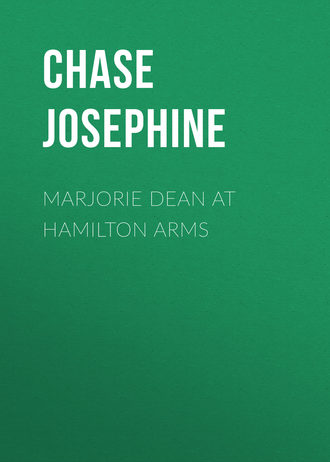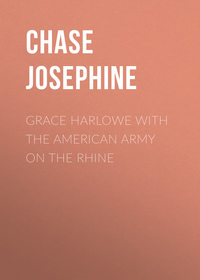
Marjorie Dean at Hamilton Arms
Since she had come to Hamilton College she had cherished two ambitions. The first had been toward popularity. The second was to achieve a trip to New York City. Popularity, because of her beauty, had quickly found her. The trip to New York had not been so easy of fulfillment. She had hoped to go to New York with Leslie at Thanksgiving. Leslie had disappointed her. More, she had utterly discouraged the idea when Doris had defiantly asserted that she would visit the metropolis alone. Leslie’s half sincere promise to show Doris about New York during the Christmas vacation was one on which Doris had fondly built. Her anger, on hearing from Leslie that she did not intend to fulfill the promise, had been so scathing as to cause Leslie to reconsider and try to make peace with wrathful “Goldie.”
Muriel’s invitation had been offered at the psychological moment in Doris’s affairs. The step in the right direction which she had planned to take would have wrought an admirable change in her before the dawn of New Years. Instead Doris had received a call from Julia Peyton which had completely uprooted her healthily growing good will toward Muriel and again thrown her upon the society of Leslie Cairns for amusement.
Leslie had received Doris’s note with a silent hobgoblin laugh and a contemptuous: “Pouf; I thought she wouldn’t stay peeved.” Deciding to keep the sophomore in suspense she had not answered the note until the very last moment. It had reached Doris on the morning of the day when college closed for the holidays, leaving her barely time to pack a trunk and arrange her affairs. Long since determined on the New York trip at some time or other, Leslie or no Leslie, Doris had saved a certain sum each month from her allowance. She had not therefore drawn on the account in Hamilton bank for the trip, nor did she intend to do so. The very sight of the bank book in the top drawer of her chiffonier gave her a feeling of uneasiness. At the time when she had burst upon the campus in her white suit, furs and shining white car she had used in the neighborhood of seventy-five dollars of the sum in bank to her credit. Since then she and Leslie had quarreled and bickered so much she wished she had never used a cent of the five hundred. She planned to return it from her own income after the trip to New York was over.
“I wish you had let me know sooner what you intended to do,” had been Leslie’s grumbling words to Doris as the two met at the Hamilton station. On receipt of Leslie’s belated note Doris had obeyed its instructions to call Leslie on the telephone at the Hamilton House. Over the telephone the trip had been hurriedly arranged.
“Why didn’t you let me know?” had been the ruffled sophomore’s strongly emphasized question. “You could have answered my note sooner than you did.”
“You should have written me long before you did.” Leslie’s emphasis had been stronger and more displeased than had Doris’s. “I told you before you left me at the Colonial that I would go to New York. You never said a word. It’s your own fault, Goldie, that you had to rush around like mad at the last minute.”
Such had been the discordant basis upon which the two girls had met at a time when all the world of light and love was pleading for “Peace on earth, good will toward men.” Once they had settled down in the train for the journey they had grown a trifle more amiable. They were both too fond of pleasure not to look forward to a two weeks’ stay in New York. Leslie had soon miraculously recovered her good humor and had proceeded to lay out a program of amusements for the first week of their stay in the metropolis. She had decided privately to “ship Goldie back to the campus the day after New Years.” That would leave her a few brief days in New York alone to go about her own affairs. Time was flying. She had difficult and important work to do which must be done soon.
She planned to humor Doris to a round of holiday gaieties. They would dine and lunch at the smartest restaurants and tea rooms. They would occupy box seats at the theatres, and at the opera. Leslie even considered introducing Doris to Natalie Weyman. That would mean an entree for Doris into New York’s most exclusive younger set. Her objection to this proposal was that Nat was “such a snip when she was jealous.” Of course she would be jealous of Doris. She was capable of “snubbing Doris off the face of the earth.” That would mean Doris in a towering rage again.
Leslie was not anxious to arouse a fresh spirit of antagonism in Doris. The self-willed sophomore was her only reliable source of campus information. Besides, Doris was more truthful than the majority of girls with whom she had chummed. She had also the virtue of silence. Goldie could be trusted not to “tell everything she knew, and a lot she didn’t know, to the mob.” Like the majority of untruthful persons, Leslie was quick to note and appreciate truth in someone else. Again, she did not fancy losing the companionship of the one girl intimate she had at Hamilton. She had spent time, patience, effort and money in cultivating Doris’s friendship. She did not propose to be a loser.
Beyond the usual brief letter which Leslie had received every Monday morning from Mrs. Gaylord, her obligingly absent chaperon might as well have been a myth. Since Leslie had settled down for a protracted stay in Hamilton, and at the Hamilton House, Mrs. Gaylord had spent an enjoyable period of visiting her relatives and friends. Leslie demanded a weekly letter from the chaperon. She answered it only as she felt inclined. It had been earlier arranged between them that, should anything of moment occur suddenly of an adverse nature to either, the other was to be immediately notified by telegram.
The one contingency which both feared was the sudden wrathful interference of Peter Cairns. Such a calamity must be shrewdly guarded against. Neither was desirous of giving up an arrangement which suited both so admirably. They had prepared a telegram against the emergency. It was: “Hamilton House Central.” It signified that they were to meet in Hamilton at the Hamilton House as soon as possible.
On the Sunday before Christmas Leslie had seen fit to write Mrs. Gaylord at Greenwold, where she was visiting a friend, informing her of the proposed trip to New York.
“Now don’t think you have to drop everything and hit up a pace for New York,” she had written with slang insolence. She had stopped to snicker after setting down thus much as she pictured plump, dignified Mrs. Gaylord proceeding on foot toward the metropolis at racing speed. “My sophy pal, Miss Monroe, and I, will stay at the Essenden. It’s exclusive enough to suit even P. G. He’ll never know we’re there, so you should fidget. I shan’t look up Nat. Deliver me from soreheads like her. At least she would be one, if she saw me with a new chum. That will cut out the society part, so don’t throw a scare over that. I think the grand old grump is out of town. Since he can’t see me in the family circle I’d rather he’d sail across the pond and disappear for a while. I heard he was going to London soon. Don’t know. I’ll write you from New York. Do as I say, and stay where you are, unless we have to telegraph. Get me? L.”
Although Leslie had put the pertinent proviso, “unless we have to telegraph,” in her letter to Mrs. Gaylord she did not anticipate any such contingency. She had a comfortable conviction that her father was probably too deep in his own affairs to think of her. Mrs. Gaylord had not heard from him. She was sure of that. Her chaperon had had instructions, in case Mr. Cairns were to write her, to inform Leslie of this by the statement: “X equals the unknown quantity.” Safeguarded by what Leslie chose to consider her own great cleverness, she felt herself a match for even her financier father.
CHAPTER XV
“I USED TO KNOW HIM”
Quite the contrary, Mrs. Gaylord did not share Leslie’s optimism. She received Leslie’s characteristic letter with lively misgivings. She knew she had no right to accept a handsome salary from Peter Cairns for chaperoning his daughter without living up to the position to the letter. Prodding conscience jarringly informed her that she had abused and was now abusing the financier’s confidence in her. Should he discover the fact he was more than likely to dismiss her and make it hard for her to find another such position.
She had intended to return to Leslie at Hamilton directly after the holidays, there to remain. She had been growing daily more and more uneasy for fear Peter Cairns might have discovered her delinquency. Continued silence on his part seemed an assurance that she had not been under a surveillance ordered by him. She knew that he might resort to such methods. He had engaged her privately to watch Leslie after Leslie had engaged her as a chaperon. He was quite likely to keep in close touch with her comings and goings.
She thought it very rash and inconsiderate in Leslie to go to New York with “one of those reckless, hair-brained students” for company instead of asking her to go. Mrs. Gaylord had no great fondness for girls. Of the Hamilton students she had met only Lillian Walbert, Alida Burton and Lola Elster; not a representative trio of Hamilton girls. She frowningly wondered who Miss Monroe was. She had not been in Hamilton enough during the fall and winter to meet Doris. She was now doubly vexed because she was fond of New York. Much as she enjoyed visiting among her small town friends she liked better the life and stir of the great eastern city.
She at once wrote Leslie an indignant letter expressing her displeasure at Leslie’s new move and accusing her of taking an undue advantage of her leniency. She was not sanguine that Leslie would receive the letter before she started for New York. She supposed it would have small effect upon her if she should receive it. She knew that Leslie would be furious with her if she took it upon herself to go to New York and resume her duties of chaperon when they were not welcome.
Mrs. Gaylord had met Leslie’s father, Peter Cairns, only once. He had sent for her to come to his New York offices not long after Leslie had engaged her as chaperon. She had walked through a maze of shining mahogany furnished offices to one behind the rest, plain and almost bare in its austerity. There she had talked with the great financier, a tall, broad-shouldered, gray-eyed man with a stern mouth and a thatch of black hair tossed off his forehead. He had said very little to her, but she had understood precisely what he expected of her. She had left the office feeling decidedly in awe of him. She discovered afterward that was the only vivid recollection she had of him.
Mrs. Gaylord resignedly resolved to make the best of the annoying situation and return to Leslie as soon as her lawless charge should return to Hamilton. She could only hope Leslie would not stay in New York beyond New Years. What a selfish girl Leslie was! She had not even wished her a Merry Christmas. Suppose Leslie were to run across her father in New York, and Mr. Cairns should inquire for her? Mrs. Gaylord felt a kind of chill go up and down her spine each time that particularly unpleasant supposition occurred to her mind. There was only one grain of comfort. Leslie would not let him know the true circumstances if she could help it. It would be to her own interest to protect those of her chaperon.
The day after Christmas Mrs. Gaylord received a letter which threw her into a panic of despair. It was a three-line letter from Peter Cairns, in his own black, jagged handwriting, ordering her to join his daughter, Leslie, in New York, immediately. He had also furnished her with Leslie’s address at the Essenden, the exclusive apartment hotel at which Leslie and Doris were registered as guests.
The uncompromising brevity of the letter was dismaying in itself. Not a word more than was necessary to convey the order had been employed. It contained neither address nor date. The envelope bore a New York postmark. She assumed that it had been written in New York. She had the office address of the financier. He had given it to her with the injunction that any letter which she might feel called upon to write him should be sealed and marked: “Personal, by order of Peter Cairns.” She resolved to write him, explaining matters. She soon found she could summon no satisfactory explanation of her absence from Leslie. The financier had engaged her to watch over his daughter; not allow her to do as she chose, regardless of convention.
Mrs. Gaylord arrived in New York and at the Essenden on the evening after the receipt of Peter Cairns’ curt message. She was tired and cross after her long journey and resentfully ready to tell Leslie a few plain truths. Her one consoling thought was that Leslie had had the good judgment to register for herself and companion at the Essenden. It was at least above the criticism of even Peter Cairns.
Leslie had taken Doris to dine at the Luxe-Garins, a vast marble pile of a hotel which New York boasted as its latest triumph in hostelry. The two girls had sallied forth to dinner in a hotel taxicab much to Leslie’s disapproval. “There are a dozen cars in our garage at the town house, and we own enough others scattered about this burg,” she had said with snappish resentment. “Just because my father – .” She had stopped abruptly, recollecting in time that Doris knew nothing of her estrangement from her father.
Doris, lovely in her crystal-beaded white frock, which was Parisian, had attracted more attention at dinner than any other woman in the room. She seemed in truth a dazzling fairy-tale princess with Leslie opposite her as a wicked wizard. Leslie had chosen to wear a white velvet gown, banded with black velvet and fur. It had a beaded, oddly-cut bodice and was bizarre in effect. It lent her a dark, sinister appearance which Doris’s white beauty made more noticeable.
The two girls had so much enjoyed the flattering notice their presence in the luxurious restaurant had created they dawdled over their dinner until it was too late to go to the theatre. Both would have liked to join the dancers on the perfectly polished floor, but knew no one. Leslie had an odd excess of family pride quite at variance with the rest of her lawless nature. She could always be trusted never to form acquaintances whose social standing she did not know. When they had finished their demi-tasse she marched Doris from the restaurant like an attendant dragon without so much as a glance at more than one plainly admiring young man. Leslie cared nothing whatever about either sentiment or young men. What she had enjoyed was the little stir Doris’s golden beauty had created.
“Tomorrow, Goldie, we’ll go to luncheon at the Gilbraithe. It’s a wonder of an eat shop. It’s the spiffiest tea room I know in New York.”
Leslie made the announcement as they stepped from the walk into the waiting taxicab. She had engaged a car from the Essenden for the evening and had planned a ride up Fifth Avenue by way of showing Doris a glimpse of the great city after dark.
“We’ll never get clear of that string of hay carts,” she predicted, motioning her head in the direction of the waiting line of automobiles. At the corner above, where the line began, the starter was working diligently to put the line in motion.
Doris merely glanced at her and again turned eager eyes to the street. They sparkled with pleasure as she took in the beautiful main entrance of the white marble hotel at her leisure.
“Ah, on the move at last.” Leslie gave a kind of satisfied growl as she felt the taxicab begin to move. It started, then came to a quick jarring stop. The starter shouted out a sharp order. It mingled with the chugging purr of the engine and the voice of the taxi driver, raised to an incensed yell at some progress-impeding object.
With her usual impatience Leslie jerked open the nearest door of the machine. She was too much of a motorist not to investigate. Her driver’s start had been blocked by a car which had been parked in front of it. The driver of the other car had boldly attempted to get under way first. She bent forward and leaned far out of the open doorway to see what was going on. The starter and her driver had united in abusing “that fresh boob.” She grinned sardonically as her driver flung a last word or two at the disappearing car. With a sharp, surprised “What?” she suddenly dodged back and into the sheltering darkness of the tonneau.
From the ornamental main entrance of the Luxe-Garins she had spied a man emerging. He stood before the great entrance doors briskly turning up the collar of his brown fur motor coat and pulling a brown fur cap down over his head as though preparing for a high-speed spin. He was a tall man, broad-shouldered, with gray eyes and a stern mouth.
From the dim cavern of the tonneau Leslie peered out at him with a curious, reverend timidity. She was careful to keep the ermine collar of her evening wrap well up about her face. So her father was in New York instead of Europe. Leslie watched him, her dark features lighting to wistful admiration. How she wished she dared open the door of the car and call out to him! No; that could not be. There was only one way to bring back his love for her. That way was to work and win it. She drew an audible sighing breath.
“What is the matter, Leslie?” Doris had heard her companion’s surprised exclamation. Now she heard the sigh.
“Oh, nothing,” Leslie affected carelessness of tone. Her gaze was still on her father. She kept hungry eyes riveted on him as he left the hotel entrance, swung down the broad stone walk and out of her sight. “Did you notice a man standing in front of the hotel with a brown fur coat and cap?” She forced a casual question.
“No; I didn’t. I didn’t notice anyone. I was thinking about whether I liked New York better than London. Of course I could never like it as well as Paris. It is a wonderful city though,” Doris said honestly. “I wish we knew some interesting men here like the explorers my father knows. He and I often have had luncheon and dinner with Jacques Fandor, the great French explorer. Do you know the man you asked me about, Leslie?” she added with intent to be polite.
Leslie did not reply at once. She hesitated for a moment then said in an odd, repressed tone: “I think I used to know him.”
CHAPTER XVI
ONLY OBEYING ORDERS
“Will you kindly tell me why you are here?” Leslie Cairns surveyed her chaperon, Mrs. Gaylord, with an anything but welcoming face. “Didn’t you understand my letter? It was written in English. At least, I thought I wrote English.” Leslie used sarcastic emphasis.
“Yes, Leslie, your letter was in English, I suppose your rude slang might be classed as English.” The chaperon’s voice was bitingly dry. Her florid, usually placid features were stiff with resentment of Leslie’s cavalier manner. “You took advantage of me in a most unfair way. Instead of writing me that you thought of going to New York to spend the holidays, you simply notified me at the last minute, completely ignoring me as your chaperon.”
“Oh, cut out the lecture!” Leslie made a derisive motion as though to push further rebuke from her. “What is the matter with you? Doesn’t our agreement hold good in New York as well as in Hamilton? Couldn’t we have got together in a few hours if necessary? I allowed for all that when I wrote you. I didn’t think it urgent to put it down in black and white. I gave you credit for having some gray matter. Who engaged you in the first place, my father, or I? He saw fit to butt in to my arrangement with you. Of course I’m not supposed to know that. Still it wouldn’t take me long to remind him of it, if he began to be fussy with me.” Displeasure of her father’s private understanding with Mrs. Gaylord momentarily banished Leslie’s regret of their estrangement.
“Leslie! I hope you would not be so treacherous as to let your father know that you – that he – that you know he and I have a private understanding about you,” stammered the chaperon in reproachful alarm. “That is a secret agreement between him and me.”
“Was a secret, you mean,” satirized Leslie, laughing with a kind of grotesque amusement. “A secret isn’t much of a secret after it goes as far as a third party.”
“Leslie!” Mrs. Gaylord repeated the name with exclamatory half-hearted wrath.
“Yes, ‘Leslie,’” mimicked her amused charge. “What’s the use of puffing, Gaylord? You know you always lose out with me in a talk contest. Sit down, take off your hat and your head will cool off. Registered at our village inn?” she raised ironic eyebrows at her chaperon.
“Yes; I have registered,” was the frigid return. Mrs. Gaylord tried not to show approval of the dainty Dresden apartment she was in. She had caught only a fleecing glimpse of Doris. The latter had promptly retreated to the bed-room she was to occupy of the expensive Dresden suite of small salon, two sleeping rooms and bath which Leslie had extravagantly engaged. “I engaged a room with bath on this floor, but – ” She glanced about the smart salon.
“No room here,” supplied Leslie. “Oh, you are welcome, of course, to inhabit the salon with Goldie and me,” she added flippantly.
“Thank you. You know, Leslie, that I have tried not to stand in your way.” Mrs. Gaylord spoke with reproving bitterness. “I am here now, not because I wish to be, but because – ” The chaperon made an impressive pause.
“Now we are getting down to brass tacks.” Leslie simulated genial encouragement.
Mrs. Gaylord frowned, but resisted bandying further words. “Your father ordered me to come to New York, Leslie,” she said with a direct simplicity which had more effect on her discourteous charge than had her air of affront.
“What?” Leslie almost screamed the question.
From the adjoining bed-room Doris heard the cry and wondered. She knew that Leslie had a chaperon, named Mrs. Gaylord, who amiably permitted Leslie to do as she pleased. While she had retired to her bed-room and closed the door, on the arrival of the chaperon, she had caught enough of the salutatory remarks between Leslie and the other woman to establish Mrs. Gaylord’s identity in her own mind. The fact that the caller had come at so late an hour further convinced her.
“Just what I say,” stiffly confirmed the chaperon. “I received this letter from him. You might as well see it.” She had opened her small seal traveling bag as she spoke. Now she handed Leslie the letter from Peter Cairns.
“Uh-h-h-h!” Leslie dropped down on a gilt-framed, pale-hued Dresden settee with a pretense of total collapse. Next second she sat up with a jerk. “Gaylord, I beg your pardon for ragging you. You seem to be a good sport,” was her half-humorous apology.
Mrs. Gaylord with difficulty maintained a grave face. Strangely enough, at heart she did not dislike Leslie. Constant companionship with the financier’s long-neglected daughter from the standpoint of a duenna had shown her plainly all Leslie’s faults and virtues. When first she had come to Leslie she had resentfully labeled her as having all faults and no virtues. Presently she discovered that Leslie was generous, not of spirit, but in a material way. She also had a virtue of minding her own affairs beyond that of any other girl or woman of Mrs. Gaylord’s acquaintance. Of Leslie’s intriguing, unscrupulous side the chaperon knew little. She admired the girl’s peculiar originality and thought her sayings distinctively clever or funny. She respected Leslie for being neither foolishly sentimental nor flirtatious. Leslie’s rudenesses she soon learned to overlook because Leslie was as civil to her as to anyone else, perhaps more civil.
“What are you going to do about it?” Leslie inquired with rueful curiosity. “He’s in New York. I saw him last night in front of the Luxe-Garins. Don’t think he saw me. I was in a taxi. Goldie and I had been there to dinner.”
“You shouldn’t have gone there – just you two young girls!” cried out the chaperon despairingly.
“Oh, stuff. I’m not a minor. Think the Luxe-Garins is a jungle full of black-whiskered lions and unicorns? We didn’t dance, or speak to a soul. We only had eats. That’s not a social blunder, is it?”
“No-o-o.” There was a certain amount of relief in the reply. “I shall do nothing, Leslie. Your father has ordered me to come here to look after you. I am here. I thought before I came I would write him and explain why we were not together. I could find no proper explanation. I dare say he is very angry with me.” Mrs. Gaylord’s tone grew rather plaintive. “As your chaperon I should insist on your compliance with strict convention at all times. But it is as you say. You are not a minor, you have the right to go where you please and do as you please. Since your father has – well – has – .” The chaperon halted lamely.









